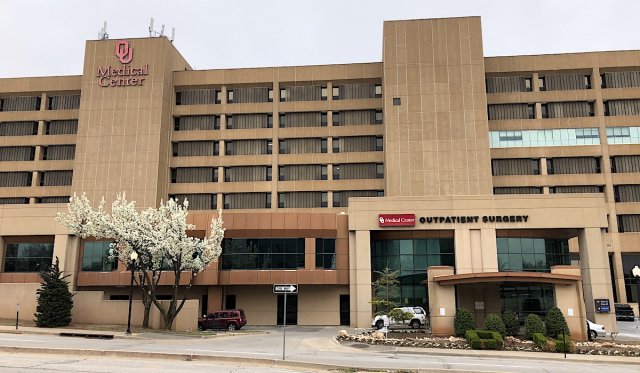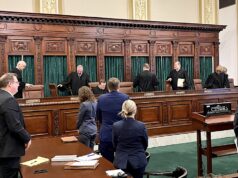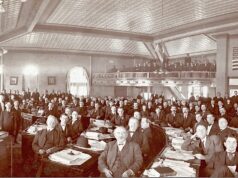

Gov. Kevin Stitt struck down four bills related to state finances late Monday, derailing efforts by the Oklahoma Legislature to grant a sales tax exemption at a teaching hospital, bond more than $160 million for endowed professorships and cut in half the cap on a tax credit for apartment builders.
While the governor’s first four budget-related vetoes of the 2020 legislative session were overridden by lawmakers last week, it’s not immediately clear whether the House and Senate intend to attempt overrides on the four bills he vetoed Monday. Pushing any measure into law despite the objection of the governor requires the support of 68 House members and 32 Senate members. The Legislature left the door open to returning for veto overrides before May 29, and the House is expected to be in session for at least ceremonial purposes Friday, May 22.
Sales tax exemption axed for hospital
SB 1703 created a sales tax exemption for the University Hospitals Trust. OU Medicine had separately pledged to use the roughly $11.1 million per year savings to fund additional residency slots at the teaching hospital.
In his veto message, however, Stitt noted that no formal requirement for the money’s use had been included in SB 1703.
“Though I am supportive of the great hospitals in our state that care for Oklahomans every day, this is not the right time to grow the list of tax exemptions that will end up causing tough budget times to be more difficult over the next few years. The cost to the state for such an exemption would be an estimated decrease in state tax collections of $11,125,421 and would make next year’s projected $1 billion revenue shortfall even larger. This change would also negatively impact sales tax collections by millions of dollars at the local level. Further, there is no language in the current bill that specifies how this money is to be spent by the UHT.”
SB 1703 passed the House 81-16 and the Senate 37-6. Tuesday afternoon, Senate Appropriations and Budget Chairman Roger Thompson (R-Okemah) released statements criticizing the veto, though he made no mention of a potential override attempt.
“This was a workforce initiative that would have improved access to health care, particularly medical specialists in our state,” Thompson said. “We’re currently ranked 46th in physicians per capita. OU has 90 unfilled spots for resident training. The exemption could have enabled us to fill those residency slots over the next three years, recruit new teaching doctors, and ultimately improve access to physicians and specialists throughout Oklahoma.”
Bonds to fund endowed professorships stopped
HB 2749 and HB 2750 worked in conjunction to authorize an additional $161 million bond package to fund the state’s matching obligation for endowed chair positions at Oklahoma higher education institutions. The measures also functionally capped the state’s funding of endowed chairs.
“This was a coordinated effort with the Regents for Higher Education and the chancellor,” Sen. Dewayne Pemberton (R-Muskogee) said on the Senate floor May 6. “Then we will be out of the endowed chair business.”
In his veto message of HB 2749, Stitt endorsed ending the state’s matching obligation entirely.
“Since the state began matching these donations, approximately $500 million has been matched with no input from the Legislature or governor as to what types of chairs and professorships would be matched,” Stitt wrote. “Instead of simply placing a cap, the more fiscally responsible course would be to eliminate matching monies all together.”
In his veto message for HB 2750, he elaborated on his opposition to the increased bond capacity.
“HB 2750 would more than double the amount of obligations the Oklahoma Capitol Improvement Authority is authorized to issue and sell to fund the state’s matching contribution to the Oklahoma State Regents’ Endowment Trust Fund. The previous amount of authorized obligations was increased to $150 million in 2010. The principal amount outstanding is $93.13 million,” Stitt wrote. “The funds from the sale of these obligations have been used for funding important positions like chairs in cancer research, animal science and engineering. I absolutely encourage and admire private donors who fund these types of positions, however requiring the state of Oklahoma to continue to match those private donations is unsustainable.”
HB 2749 passed the House 96-4 and the Senate 43-0. HB 2750 passed the House 96-4 and the Senate 42-1.
Stitt calls tax credit cut ‘retroactive’
HB 2760 dropped the annual cap on the Affordable Housing Tax Credit from $4 million to $2 million per year. The bill was opposed by a bevy of lobbyists, who argued it was changing the rules of a tax credit program in the middle of a game.
“My office has received numerous phone calls and emails from constituents across the state expressing concern about the implications of this bill. The effective date of this legislation is retroactive, and thus negatively affects projects currently under contract for this year. Furthermore, due to the nature of these projects and the way the credit works, our state would not see financial return until FY 2023,” Stitt wrote in his veto message for HB 2760. “I support and advocate for comprehensive tax policy reform in our state. We must have a larger conversation about overhauling Oklahoma’s tax policy towards diversification and long-term sustainability. However, during an economic downturn, we should not single out winners and losers, but tackle broad and meaningful reform. I look forward to working with the Legislature in the future to accomplish this much needed task.”
HB 2760 passed the House 59-41 and the Senate 25-20.
House Appropriations and Budget Vice Chairman Kyle Hilbert (R-Depew) authored the bill and told Janelle Stecklein of CNHI that a member of Stitt’s cabinet had suggested cutting the tax credit cap in March.
“It is certainly odd that they vetoed a bill that a member of their administration requested,” Hilbert said in a message to NonDoc. “The House and Senate agreed to it during that March 20 budget meeting and have had it on our books as a revenue line for the budget ever since. That said, I stand by the bill as it is the right thing to do for our state. The first three years alone only brought in $10 million while costing $116 million in taxpayer dollars.”
Hilbert said each year’s tax credits extend for 10 years.
(Update: This article was updated at 1 p.m. Tuesday, May 19, to note that it takes 68 House votes to override a governor’s veto. It was updated again at 1:50 p.m. to include a quote from Thompson, and it was updated again at 4:40 p.m. to include Hilbert’s comment.)




















